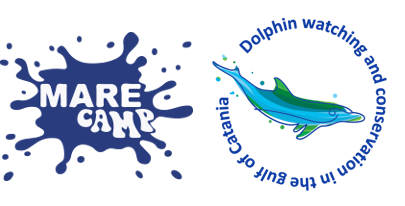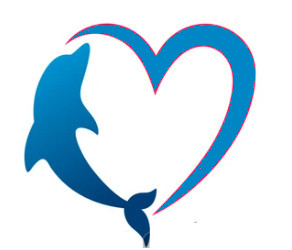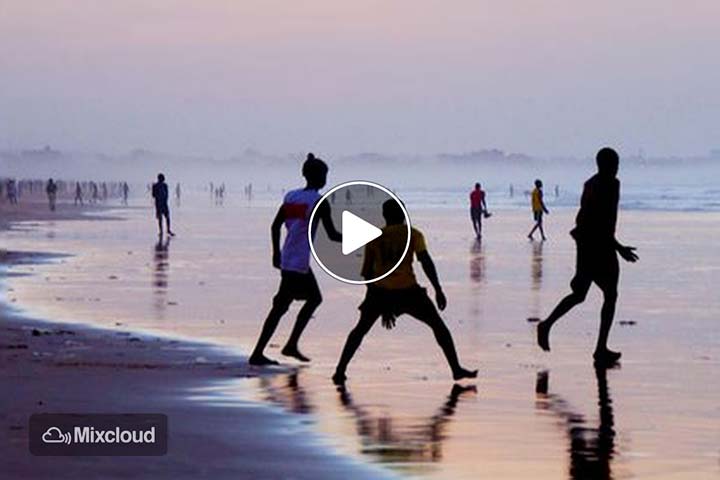Accedi
- Questo indirizzo email è protetto dagli spambots. È necessario abilitare JavaScript per vederlo.
-

“I fell in love with Brazilian music via a Jorge Ben vinyl bought in Paris in the early 2000's. His sound was clearly related to the soul and funk records that I was collecting at the time but with a sunny edge and a language that would sound more similar to mine. A couple of years later I moved to Brazil as a consequence of that growing passion for tropical sounds and found myself living in one of the most exciting music cities: Recife.
-

Press Release Marecamp no.5
Catania, April 9th 2024
Catania: everything is ready for the opening of the European Conference on Cetaceans.
Over 600 attendees from all over the world.
Just one day left before the big event, an international conference on the cetacean field and the challenges of achieving sustainable development of coastal areas, mitigating the effects of human actions on the marine ecosystem and supporting the conservation of marine mammals.
This is also a challenge for the Marecamp Association, the official organizer of the Conference, which in collaboration with the Department of Biological, Geological and Environmental Sciences (DSBGA) of the University of Catania is preparing to host more than 600 participants already registered for the 35th Annual Conference of the European Cetacean Society (ECS) on the theme Marine mammals and human activities: how to reach a sustainable development of coastal areas? This will take place from 10 to 12 April 2024 at “Le Ciminiere” Congress Center in Catania, preceded by two days of parallel themed workshops at the same DSBGA.
Speakers will include professors, researchers and students from the entire Euro-Mediterranean area and beyond – there are also participants from China, Brazil, New Zealand, Australia, USA, Singapore, and India – who will present their scientific work on marine mammals. The opening speeches of each day will also be given by experts of international caliber such as Frances Gulland (President of the US Marine Mammal Commission), Bruno Cozzi (Founder of the Centro Studi Cetacei), and Philip Hammond (Professor of Ecology at the University of St Andrews).
The event is realised thanks to the voluntary work of the experts of the Local Organizing Committee (LOC) coordinated by Marecamp, with the support of the ECS Council. Furthermore, the Conference enjoys the patronage of the Department of Mediterranean Fisheries (Department of Agriculture, Rural Development and Mediterranean Fisheries of the Sicilian Region), the Municipalityand the Metropolitan City of Catania, and the University of Catania.
We invite you to spread the event as widely as possible, the opening of which is scheduled for tomorrow 10 April 2024, at 9:00 am, at the Le Ciminiere multifunctional exhibition center in Catania (viale Africa 12, 95129 Catania). The conference program can be downloaded here.
More information at:
https://www.marecamp.com/en/35ecs2024-catania
https://www.europeancetaceansociety.eu/35th-annual-conference-catania-sicily-italy
Statements released from the Organizers during the press conference to present the event:
"Marecamp has worked hard to realise this conference, from Catania's candidature to the whole organisational machine set in motion with the LOC, thanks to which today we can say that everything is ready to open the dances. We firmly believe in a possible human-cetacean coexistence, and that turning the spotlight on this topic in Catania is of fundamental importance and stimulus, both for the local community and for scientists working in the Mediterranean and other seas." - Dr. Clara Monaco, President of the Local Organising Committee and Scientific Committee of the 35th ECS Conference, and Marecamp Scientific Officer.
"Our department's classrooms will host workshops that students will be able to attend with a twofold advantage: enriching their knowledge of Cetaceans, a group of marine Mammals that is much loved but at the same time little known, especially regarding their biology and conservation status. The other advantage will be the opportunity to exchange ideas, impressions and knowledge with students from other European cities. The University of Catania is pushing hard on the internationalisation pedal and our students now have a large number of agreements with other European universities ready to welcome them under the Erasmus programme, just as the University of Catania is ready to welcome the European students. What better occasion then will the conference give us than to welcome European professors, scholars and students to our home?" - Prof. Venera Ferrito, ECS Contact Person for the University of Catania, Department of Biological, Geological and Environmental Sciences.
"In almost 40 years of existence of the ECS, many countries have hosted its annual conferences, and only 3 of these have been hosted in Italy. Six years after the last one, held in La Spezia, today we are extremely pleased to have the opportunity to organise the ECS Conference in Sicily for the first time, sure that Catania will give us a perfect welcome." - Dr Joan Gonzalvo, President of the European Cetacean Society (ECS).
Supporters of the event: Chelonia Limited - Wildlife Acoustic Monitoring; ACCOBAMS - Agreement on the Conservation of Cetaceans of the Black Sea, Mediterranean Sea and contiguous Atlantic area (ACCOBAMS); Communication Technology; co.l.mar. ; Sustainability journals, Marine Science and Engineering, Diversity, and Animals of the publisher Multidisciplinary Digital Publishing Institute (MDPI); Hygiene and Food Laboratory (LIAA) of the Department of Medical, Surgical and Advanced Technological Sciences 'G. F. Ingrassia' of the University of Catania; NetSense; and CityMap Sicilia.
UFFICIO STAMPA E COMUNICAZIONE MARECAMPQuesto indirizzo email è protetto dagli spambots. È necessario abilitare JavaScript per vederlo. • +39 331 437 6987 -
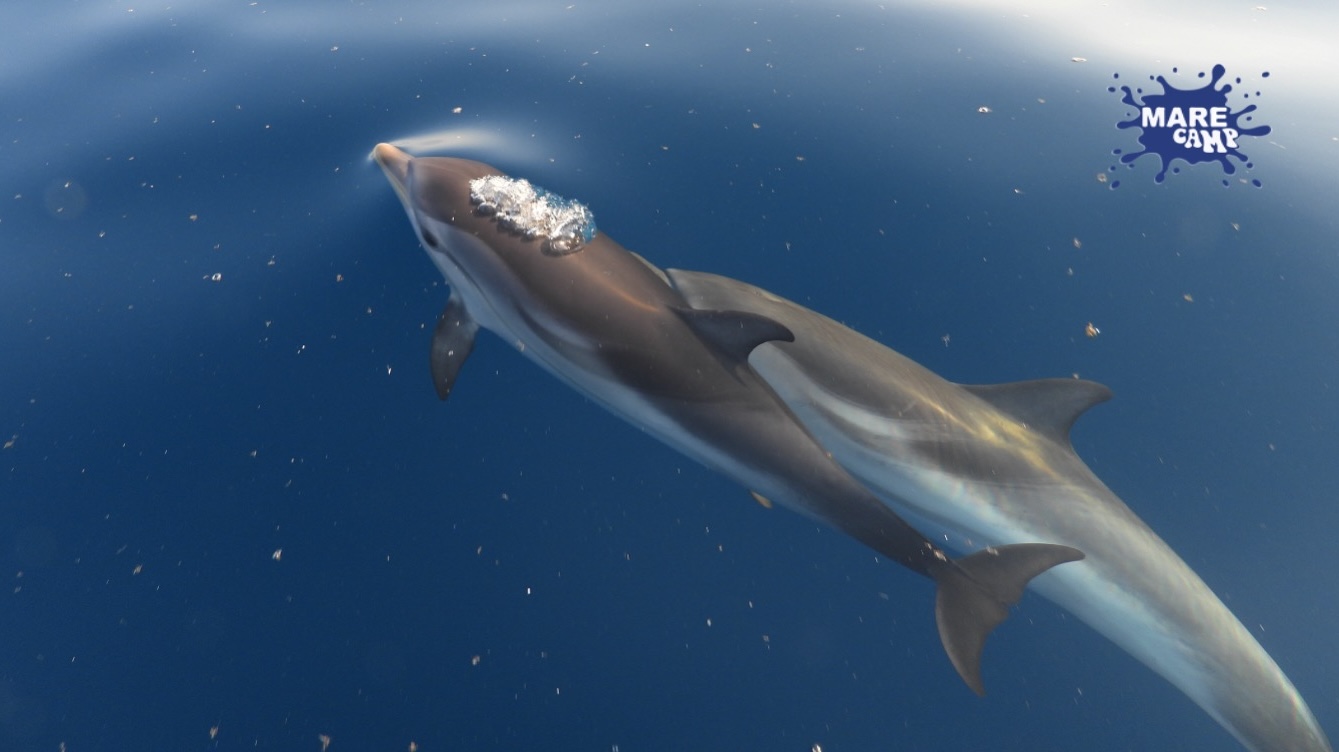
Trasmettiamo di seguito il Comunicato stampa odierno 05/2024
Giornata Mondiale degli OceaniMarecamp tira le somme sulla conservazione dei cetacei nel MediterraneoCatania, 8 giugno 2024 – In occasione della Giornata Mondiale degli Oceani, l'associazione Marecamp condivide i significativi traguardi raggiunti nel campo della conservazione dei cetacei. Grazie all'impegno costante di volontari e collaboratori, e una fitta rete di partner nazionali e internazionali, Marecamp ha potuto contribuire in maniera determinante alla protezione di balene e delfini, specie cruciali per l'ecosistema marino.
Grazie al programma Dolphin Watching and Conservation in the Gulf of Catania, negli ultimi cinque anni Marecamp ha sviluppato programmi educativi che hanno coinvolto più di 8.000 cittadini del mondo, tra cui oltre 1.000 giovani attraverso scuole e università, sensibilizzandoli sull'importanza della biodiversità marina. Insieme, sono stati monitorati centinaia di cetacei lungo le coste siciliane, raccogliendo per sei mila miglia nautiche dati preziosi sulla loro salute, comportamenti, e interazione con le attività umane la cui pressione risulta sempre più intensa nella fascia costiera. A tale proposito, l’associazione ha condotto anche ricerche e sperimentazioni innovative per migliorare le strategie di mitigazione degli impatti per una conservazione a lungo termine a favore della protezione degli habitat naturali dei cetacei, come i dispositivi di allerta delfino per le reti da pesca.
Tra le azioni dirette e partecipate, anche la raccolta dei macrorifiuti galleggianti realizzata assieme ai cittadini, che vede rimuovere 7 tonnellate di rifiuti l’anno di cui il 94% plastica. Studenti, diportisti, pescatori ricreativi e professionali, autorità marittime, e diving hanno inoltre aderito all’iniziativa “Amici dei delfini” inviando centinaia di segnalazioni all’anno di avvistamenti di tartarughe e mammiferi marini vivi e spiaggiati in pieno spirito della citizen science, permettendo il censimento di specie anche rare come orca, pseudorca, steno, foca monaca, tartaruga liuto, e megattera, che si aggiungono alla già ricca biodiversità della Sicilia orientale che conta ulteriori sei specie di cetacei regolari monitorate costantemente dall’associazione.
Nel corso degli ultimi mesi, Marecamp è inoltre stata promotore della divulgazione internazionale sulla conservazione dei mammiferi marini, attraverso l’organizzazione del convegno scientifico annuale della European Cetacean Societynella città di Catania, eletta Capitale Europea dei Cetacei per l’anno 2024. In tale occasione, oltre 800 persone tra studenti, ricercatori, e docenti si sono confrontati sullo stato di salute delle popolazioni marine studiate e sulle migliori strategie adottate per la loro tutela, attraverso talk, short speech, e poster presentation. Presenti 66 paesi provenienti da tutto il continente europeo, e anche da Australia, Brasile, California, Canada, Cina, Colombia, Groenlandia, Hong Kong, India, Israele, Kazakistan, Nuova Zelanda, Stati Uniti, Tanzania, Texas e Turchia. Un evento unico condotto da Marecamp in collaborazione con il Dipartimento di Scienze Biologiche, Geologiche e Ambientali (DSBGA) dell’Università di Catania, e patrocinato da Regione Siciliana, Comune e Città Metropolitana di Catania, e Università di Catania.
Nel proseguire a lavorare con dedizione per garantire un futuro sostenibile per i cetacei e gli oceani, anche quest’oggi Marecamp realizzerà una delle sue uscite in mare, nel golfo di Catania, studiando la fauna locale e permettendo la partecipazione alle attività di bordo a personale non specializzato, ospitato come di consueto per rafforzare la consapevolezza della comunità nei confronti della salvaguardia del Mediterraneo.
Associazione Marecamp ODV (ETS)+39 331 437 6987Supporters della Conferenza ECS: Chelonia Limited – Wildlife Acoustic Monitoring; ACCOBAMS – Agreement Agreement on the Conservation of Cetaceans of the Black Sea, Mediterranean Sea and contiguous Atlantic area (ACCOBAMS); Communication Technology; co.l.mar.; riviste Sustainability, Marine Science and Engineering, Diversity, e Animals dell’editore Multidisciplinary Digital Publishing Institute (MDPI); Laboratorio di Igiene e degli Alimenti (LIAA) del Dipartimento di Scienze Mediche, Chirurgiche e Tecnologiche Avanzate “G. F. Ingrassia” dell’Università di Catania; NetSense; e CityMap Sicilia.
Dona il tuo 5x1000 a Marecamp, sostieni la conservazione dei cetacei!
------------------------------------------- -

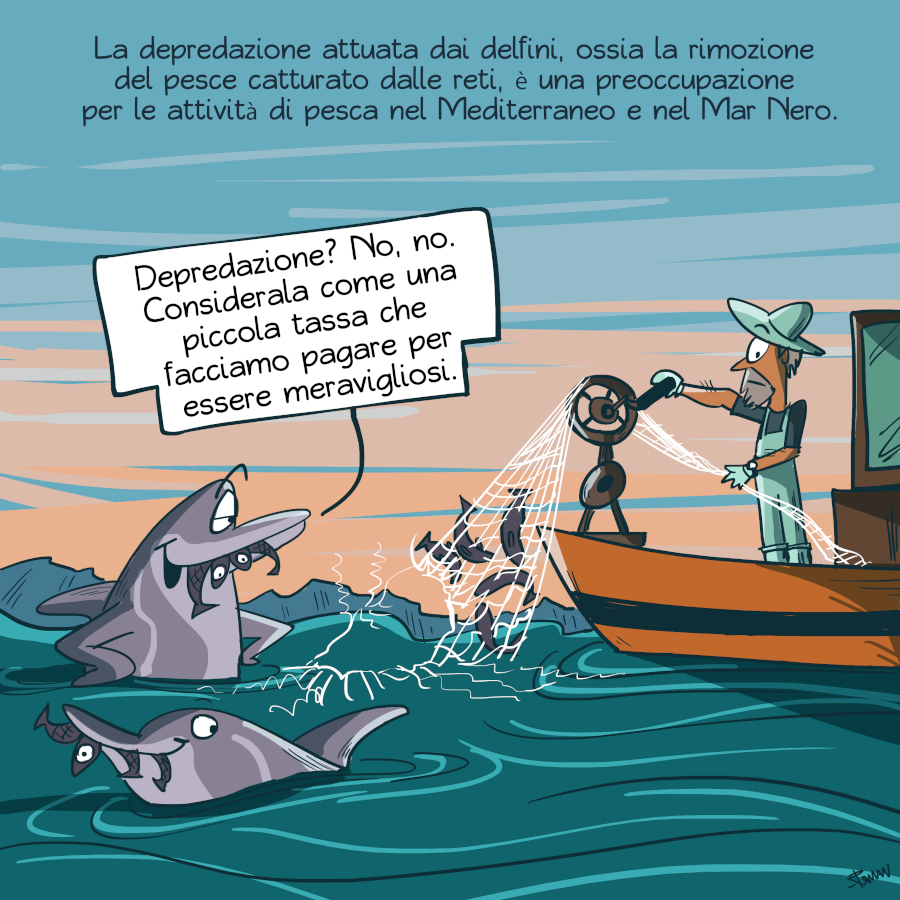
Comunichiamo l'attivazione di n. 4 nuovi tirocini curriculari e/o extracurriculari, con precedenza a studenti il cui piano formativo universitario preveda la stesura di una tesi sperimentale. I tirocini prevedono attività in campo nell'area della Sicilia orientale che includono imbarchi giornalieri su pescherecci e imbarcazioni scientifiche, nonchè indagini su terra ferma presso i principali porti della suddetta area.
PROGRAMMA DI RICERCAI tirocini saranno realizzati nell'ambito del progetto "DEPREDATION-3: Monitoring activities and mitigation measures for the reduction of dolphin depredation in small-scale fisheries - Western Ionian Sea (GSA 19)" dell'Associazione Marecamp, svolto in collaborazione con ACCOBAMS (Agreement on the Conservation of Cetaceans of the Black Sea, Mediterranean Sea and Contiguous Atlantic Area), e sostenuto dalla GFCM (General Fisheries Commission for the Mediterranean) della FAO (Food and Agriculture Organization of the United Nations).TEMATICHE AFFRONTATESforzo di pesca, specie vulnerabili, cetacei, ecologia, bioacustica, etologia, Photo-ID, nuove tecnologie.
DURATA TIROCINI
Da 3 a 6 mesi, avvio immediato.
COSTI E SOSTEGNI
Tutti i tirocini Marecamp non richiedono MAI costi di partecipazione. Al contrario, offriamo una formazione gratuita e, a seconda dei progetti attivi, prevediamo dei rimborsi spese per i nostri stagisti. Diffidate da chi chiede una quota di partecipazione per svolgere un tirocinio. I tirocinanti del progetto Depredation-3 potranno godere di rimborso missioni (pasti, carburante) in caso di attività in campo particolarmente distanti dalla sede operativa base di riferimento.
LOCALITÀ
Indicativamente, le attività di monitoraggio avverranno lungo l'intera area costiera della Sicilia orientale, interessando i principali porti delle province di Messina, Catania, e Siracusa. La raccolta dati in mare avverrà nelle zone di pesca dove operano le marinerie di Messina - Giardini Naxos - Riposto - Aci Castello - Catania - Siracusa - Portopalo.
L'implementazione delle misure di mitigazione sarà condotta attraverso attività presso i porti e le zone di pesca dell'area di studio centrale e meridionale, interessando le flotte delle province di Catania (da Riposto a Catania), e Siracusa (da Brucoli a Siracusa, e da Avola a Portopalo di Capo Passero).
REQUISITI
Indispensabili: ottime condizioni fisiche; non soffrire il mal di mare; predisposizione al lavoro in team; ottima padronanza del pacchetto Office; madrelingua o ottima conoscenza della lingua italiana; essere automuniti.
Preferenziali: conoscenza base di software di bio/geo-statistica; buona conoscenza di almeno una lingua tra inglese e francese; tirocinio finalizzato a tesi di laurea.
CANDIDATURE
Inviare cv e lettera motivazionale a Questo indirizzo email è protetto dagli spambots. È necessario abilitare JavaScript per vederlo. con oggetto della mail "TIROCINI24, nome e cognome del candidato, università di provenienza". Una prima selezione sarà fatta il 02/04/24, con possibilità di colloqui in presenza o via piattaforma web nei giorni a seguire. Qualora rimanessero posti disponibili, una seconda selezione verrà fatta entro il mese di maggio 2024.INFORMAZIONI SU MARECAMP
Marecamp ha due basi operative presso i porti di Catania e Aci Castello, e possiede 3 imbarcazioni dai 7 ai 14 metri. Coordina inoltre il network di laboratori galleggianti composto da pescherecci di piccola scala che operano nelle acque siciliane e ospitano a bordo osservatori scientifici. Il team di esperti Marecamp è composto da Istruttori federali di motonautica e Biologi marini con esperienza pluriennale in progetti volti ad ampliare le risorse di dati disponibili per la comunità scientifica sullo stato di conservazione delle specie di cetacei del Mediterraneo, mitigare le problematiche legate ai casi di interazione pesca-cetacei, nonché promuovere la cultura del mare e il suo rispetto attraverso percorsi formativi, di ricerca, e divulgativi.
Maggiori informazioni sull'associazione sono reperibili qui Chi SIAMO-------------------------------------------


